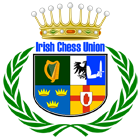Big Brother
The youngest of five children, I learnt the moves at age 10 from an older brother. When I started to beat him, he would introduce new "rules" until, eventually, he ran out of them. At age 12 I joined the school chess club at St. Malachy's College, Belfast and rapidly improved. I took part in Ulster schools chess tournaments, eventually winning the senior schoolboys' championship in 1967, and came into contact with contemporaries such as John Moles, Hugh MacGrillen, Gerry McCurdy and Larry Graham.
Irish Champion at 19
My first Irish championship appearance was in 1966 when John Moles won. The next year, still aged only 16, I matched Heidenfeld's top score in Cork but Wolfgang was declared winner on tie break. However, at the fourth attempt, in 1970, I finally won, ahead of Moles.
Mathematics
In 1969 I went up to Cambridge to study mathematics. I played for my college side and took points off some of some of the better players around the scene then, including A.H.Williams and, much to his disgust, Raymond Keene. I graduated 1st class in mathematics in 1972, took a further M.Sc. the following year and then moved to the Wolfson College, Oxford, to do further research leading to a doctorate (Some 3-local problems in finite simple group theory) in pure mathematics in 1976. Aside from the 1974 Olympiad I didn't play much chess during the period 1972 to 1977. In part this was due to the pressures of work but another part was the allure of other activities. Meeting people every day in college at Oxford from disciplines other than mathematics encouraged interests in literature, poetry, theology and music. I felt the need to expand rather than to concentrate on one thing, despite the thought this might not be the optimal way of perfecting ones game. I also felt the need to do some sports, including squash, cycling and running in order to keep fit.
Medicine
In 1976 I moved back to Belfast and decided to pursue a career in medicine. I'm still not sure why I did this although I've been asked many times by interview panels! It was partly due to a disenchantment with mathematics research and partly due to a scarcity of postdoctoral fellowships in mathematics at the time.
After a year of teaching at the Royal Belfast Academical Institution I started as a medical student in the autumn of 1977 and took up chess again which I played on and off until graduating in 1982. However, the time I could devote to chess became increasingly restricted. After some mediocre tournament results and losses to inferior players (which I resented) I took the advice of a friend and packed in chess completely before things got any worse.
No Time to Blow my Nose
Since then my life has become even busier: hospital practice, postgraduate exams, marriage (in 1984) to Dympna (a nurse) and five children born between 1987 and 1998 have scarcely left me time to blow my nose. I was finally appointed as a consultant in clinical oncology at the Northern Ireland Centre for Clinical Oncology in the spring of 1994 where my work load has been steadily increasing.
In my early years I enjoyed the chance to play in tournaments abroad and made many chess friends, some of them life-long (John Moles, Gerry McCurdy). I still love chess and would like to play again but just can't see any realistic chance of having the time.
My Chess Style
I prefer to defend a chess position rather than to attack. My explanation for this preference involves two psychological tendancies: (1) I have never felt very creative (my Ph.D. was hard going) and defence requires less creativity than attack; (2) I don't feel comfortable taking risks, the job of the attacker. I think I was tactically OK but just "lacked the confidence to go for it" and speculate that my results would have been better if I had had the courage to "let rip a bit more". A typical Henry win would see me nursing a small advantage into the endgame, the phase of the game I enjoyed most. However, that's not to say I never blew anyone away, as you can see from the following two games. The first is against David Dunne and the second, my favourite, is against the Italian master Tatai.
What appeals to me about chess is the logic and harmony of the game, but at the board I used to suffer from nerves. I found that my best games tended to be in Olympiads where I felt the pressure was off and personal identity was lost in the team effort. In the 1966 Irish schoolboys' championship I had a winning position against a lad called T.Lewis but took the jitters, missed an easy win and even lost when a draw would have secured the title. An experience I never forgot.
Favourite Player
My choice of favourite player is a toss up between Botvinnik and Fischer, both of whom are all-rounders with logical and harmonious styles and plenty of fighting spirit. I enormously admired Botvinnik's handling of the French Defence (which was also my first defence to 1.e4) and Fischer's of the Ruy Lopez. One of my favourite games is Botvinnik's famous win against Capablanca in the 1938 AVRO tournament: clarity of purpose, a precision attack with limited resources, decoying tactics and an elegant finish.
